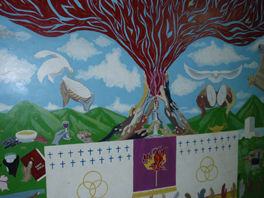On the campus of the Martin Luther King Jr. Evangelical University, students study among lush gardens and stroll along open, breezy hallways.
But the university’s setting isn’t its only draw — the campus is also home to the Interchurch Center for Theological & Social Studies (Centro Intereclesial de Estudios Teológicos y Sociales, or CIEETS).
Created in 1985, CIEETS has two main arms: theological education and community development projects related to agriculture and the environment.
CIEETS comprises 22 denominations and unites 400,000 people in Nicaragua, including Moravian, Pentecostal, Mennonite and Church of Christ members. The Presbyterian Church (U.S.A.) partners with the Moravian Church of Nicaragua and with CIEETS.
Evangelical Faculty of Theological Studies
The theological part of CIEETS is the Evangelical Faculty of Theological Studies (FEET). Its aim is to increase education among pastors and community leaders, encouraging them to be more contextual, open and inclusive, said Blanca Cortes, dean of the theological faculty.
CIEETS and its faculty concentrate on the Pacific side of Nicaragua, which has five satellite sites. In 2009, faculty worked with 900 students, focusing on three levels of education: basic, intermediate and higher (bachelor’s and master’s degrees).
In many Nicaraguan communities, people become pastors not after years of education, but because they are known as community leaders, Cortes said. Theological education comes after they’ve been established as a pastor — if it comes at all.
CIEETS works to provide theological education at all three levels. No one comes in with a blank slate, Cortes said, adding that learning should take place in community and that education isn’t just about gaining knowledge — it’s about learning new ways to look at the world.
CIEETS also has a theological program for women who are leaders in the church. The program focuses on the development of women, both in their theological studies and personal lives, touching on themes of abuse, body issues and exclusion. Not many women are accepted as pastors in Nicaragua, and the program has faced some difficulties because of churches’ patriarchal structures, Cortes said. Some male pastors and husbands of female pastors don’t want women to go to such a program and censor the materials that discuss body issues.
Developing progress
The agro-ecological arm of CIEETS works in rural areas to educate and advocate for clean water, sanitation, food security and risk management. Staffers work with about 800 families in the Pacific area, with each of the five regions having one facilitator.
The department also works with ecumenical partners, including Action by Churches Together, Presbyterian Disaster Assistance and Church World Service.
In the area of food security, CIEETS works with families on small farms that traditionally grow basic grains. CIEETS works with them to diversify their crops and decrease the risk of losing everything in a bad season.
Lately, a big focus has been clean water and sanitation. Many rural Nicaraguans drink contaminated water, getting their water from the same rivers used as bathrooms, washing areas and animal watering holes.
Clean water is a right, not a charity, said the CIEETS staff, who try to work with government authorities to ensure such rights. Although laws say municipalities are responsible for providing clean water, many do not do so. Instead, money is used for things leaders see as more important. Because NGOs have taken on the work of clean water, government officials feel they don’t have to do anything, said the CIEETS staff. In Nicaragua, the government is more invested in cities and does not care as much about rural areas.
But there has been some success in the work for clean water. In Matagalpa, a city north of Managua, CIEETS has installed chlorinators in three water systems. It is also working with municipalities’ environmental committees and community leaders to set up training.
Training is an integral part of the agro-environmental arm of CIEETS. It’s important to leave communities and leaders trained so that they are self-sufficient and aware of their rights.
Throughout Central America, governments and leaders are corrupt, the CIEETS staff said. When people work with NGOs, they see that when they band together, they can expect their rights to be followed.
Interviews were conducted in Spanish and translated into English by Stan DeVoogd, coordinator for Mexico and Central America in World Mission.

